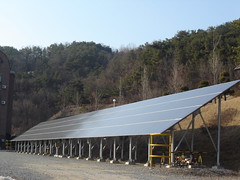(From New Statesman, 16 April 2010) Election 2010: Party promises | Energy and environment – Chatham House’s verdict.
Plenty of ideas, not many details
The parties’ key messages on energy and the environment echo the wider focus of their respective campaigns. For Labour, only active government can shape the markets to prioritise green growth and job creation. The Conservatives would go with human nature, promising new incentives and market signals to reward people for doing the right thing. The Liberal Democrats weave the environment into the heart of their economic recovery plan and, like the Tories, highlight opportunities for green taxation.
Each party mentions biodiversity, sustainable farming and fishing, endangered species, recycling and water conservation. But in each area, with the important exception of illegal forestry, all three are thin on detail. Only the Lib Dems cover, briefly, the link between environment and health. But all three make a dangerous omission: none of them explains how the UK will thrive in a world facing increasing pressure on resources such as water, food and minerals.
The parties agree on the scale of the climate change challenge. Labour and the Tories both aim for 80 per cent lower emissions by 2050 compared to 1990, in line with the Climate Change Act 2008, and the Tories argue that significant energy markets reform is required. The Lib Dems plan to move Britain faster down the curve and by 2050, they say, this country would be zero-carbon.
They might be accused of over-optimism; their 2050 target is backed up by limited analysis. But to their credit, environmental issues are integrated with each of the main priorities in their manifesto. Labour’s big problem is that, even with improvements in some areas, so far the UK has failed to meet its renewable energy targets, despite the government’s strong international rhetoric. The Conservatives may have the clearest message on low carbon innovation and enabling behaviour change. But their position on environment is hampered by their broader stance on Europe – they have little to say about the wider role of the European Union in environmental policy. In contrast, the other two are forthcoming about pushing towards a 30 per cent emissions reductions target for the EU, and promise to work at EU level to deliver international progress on the environment – for example at the UN, WTO and G20.
Green issues figure less in the manifestos than would have been expected a few years ago, but they will not go away. There are good ideas in the all three, but often little detail of how goals can be achieved. Pressing environmental concerns – climate change, deforestation, over-fishing and water resources – will find their way back up the public policy agenda in the next five years. We must ask the politicians for more: broader visions, and clearer commitments.
Felix Preston is a Research Fellow at Chatham House
Read the manifesto promises on energy http://www.newstatesman.com/2010/04/election-promises-energy
and the environment http://www.newstatesman.com/2010/04/election-promises–environment

